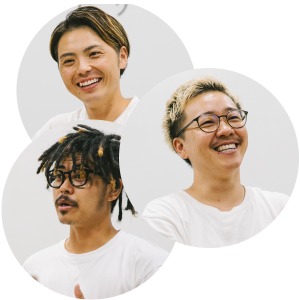トランスジェンダーという共通のアイデンティティをもつ、おおちゃん・あさひ・まさ の3人によるユニット「ミュータントウェーブ。」。SOCIAL INNOVATION WEEK(SIW)のフェローを務める彼らは今回、とても興味深い2つのワークショップコンテンツを実施します。
彼らの活動に込めた思いから、SIWへの意気込みまで、楽しくお話をうかがいました——
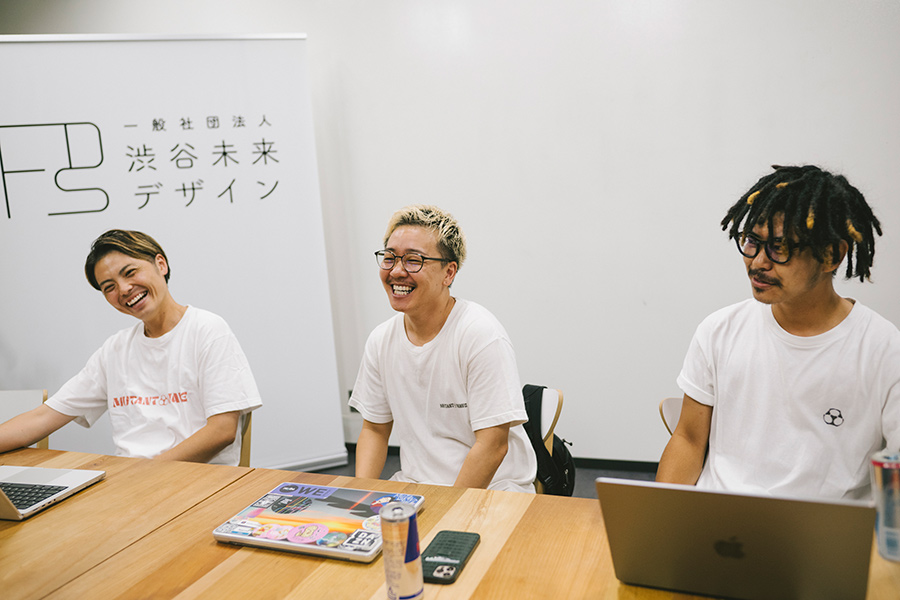
他人との“ちがい”を持ったまま、混ざり合っていられるのが渋谷
— あらためてミュータントウェーブ。の活動についておしえてください
おおちゃん:僕たちはジェンダリストって名乗ってます。なでしこリーグの女子サッカー選手をやっていて、引退後、男性に戸籍を変えたメンバーっていうのが共通する点で、ジェンダーに関わる切り口から、いろんな気付きのきっかけを届ける活動をしています。
YouTubeでの発信だったり、研修やコラボを通した企業との連携、また、幼稚園から大学生まで幅広くこどもたちや学生さんたちに向けた授業を行なうなかで、LGBTに関することを普及するというよりも、LGBTという一つの面を通していろんな人の“ちがい”や“個性”というものを体感してもらいたいと考えています。
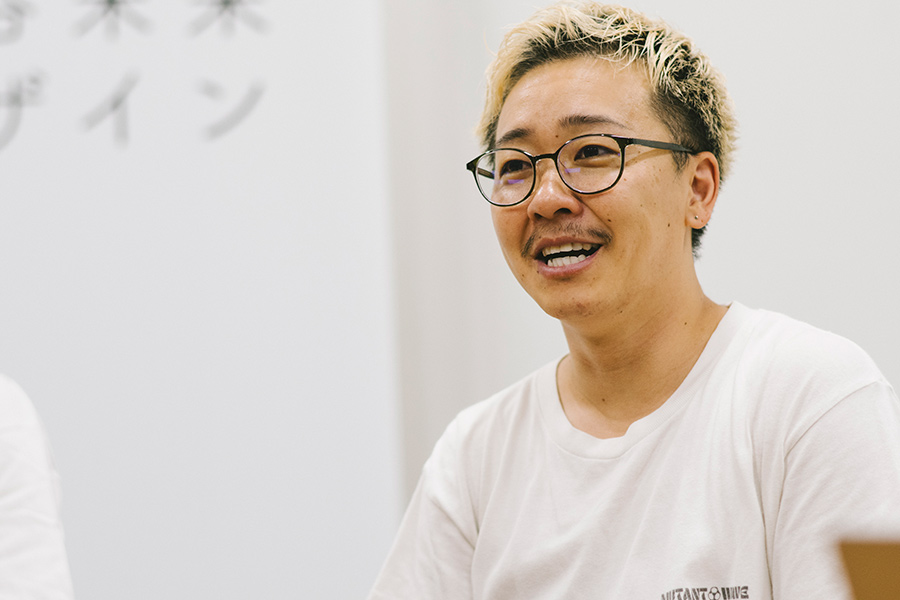
— LGBTというテーマに限らず、他者と理解しあうこと自体をトピックにしているんですね。
みなさんは渋谷区観光協会のフェローとしても活動されていますよね?
あさひ:観光協会のフェローとしての活動は、まさにこれから、どんなことができるか模索している段階です。
おおちゃん:例えば渋谷ってパレードとかもやっていて、いろんな人が過ごしやすいまちだよねとは言われるけれど、当事者にとってほんとに安心できる場所って渋谷のなかではどこなんだろうとか、それをきちんと知らせていく方法ってどんなことだろう、とみんなで考えています。
— 安心できない場所というとたとえばどんな場所なんでしょう。
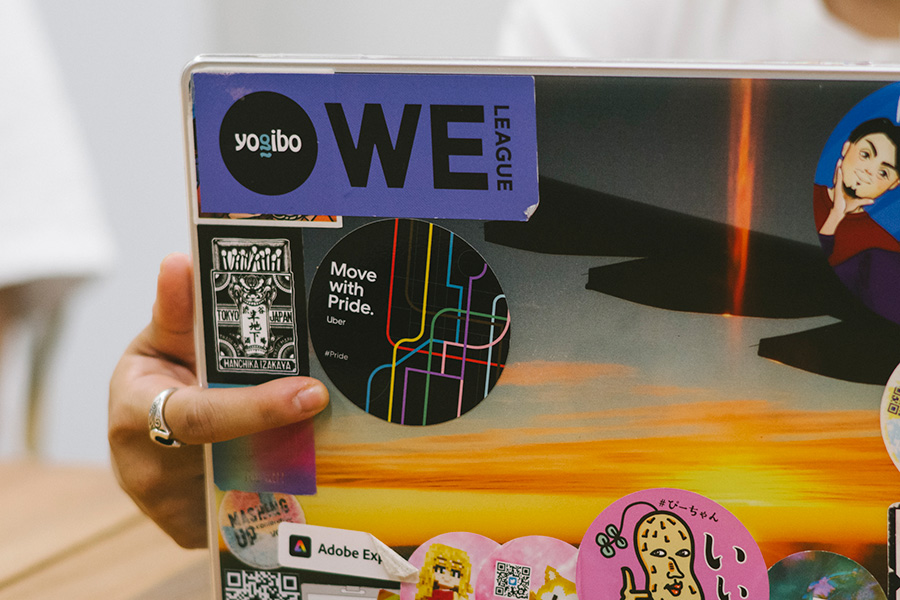
おおちゃん:たとえば、これ(PCに貼られたステッカー)なんかもそのひとつなんですけど、これってUberさんが出しているALLYステッカーと言われるもので、LGBTのレインボーフラッグをUberさんのステッカーデザインの中に取り込んだものです。このように企業がLGBTに対する応援やサポートの意思表明をすることが、特に海外では多くあります。こういうステッカーがたとえばお店に貼ってあったりすると、何か差別的なことをされたり、怖いと思ったら、うちのお店に来ていいよ、守りますよ、っていう表明になるんですね。お店に行った時にそういうステッカーが貼ってあるだけで安心できたり、そういう自分を何も隠さずそこにいてもいいんだっていう安心感になりますよね。
— みなさんにとって渋谷というまちはどんなイメージですか?
あさひ:日本のなかでも特に多様な人や文化が混ざり合っていて、「なにかやりたい」という人がそこでやっていいんじゃない? って思えるカルチャーがあるまちだとすごく感じてます。
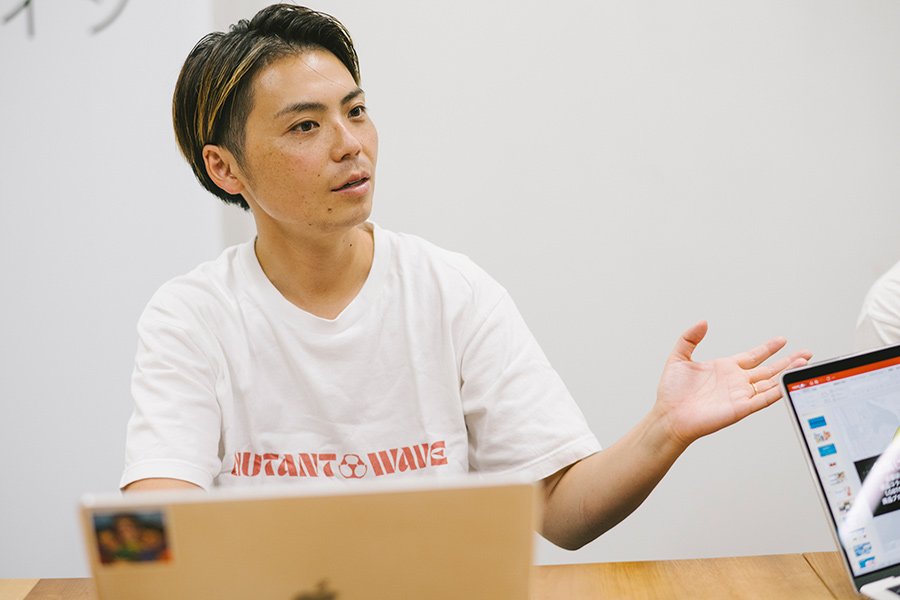
おおちゃん:刺激的なまちだよね。
あさひ:たとえば「(新宿)2丁目」ってありますけど、2丁目と比較して渋谷はいろんな文化が融合していく、ミックスしていく、っていうイメージがありますよね。文化は混じり合っていいんだなっていうのをすごく感じられるまちが渋谷なんだと思います。
— 混ざり合っていることが普通、というか。
あさひ:分断がないというか。
おおちゃん:たとえば僕たちがメディアに取り上げられるときに、LGBTの当事者だから“LGBTの普及のために立ち上がった人たち”っていう見出しになったりしがちなんですけど、それと同じで、「当事者だから2丁目とかもよく行くんだよね」みたいな見られ方には違和感があるんですね。2丁目だって、別にそうじゃない人も普通にいていいはずだし、逆に渋谷の場合は、そういう人もいれば、そうじゃない人たちもいて交われる場所、っていう印象があります。
あさひ:そう、そう。
— 正直に白状すると、この記事も、みなさんがLGBTの当事者だからといってLGBT関連の切り口に縛られたものに仕上げてしまうつもりだったことに、いま気付かされました…。
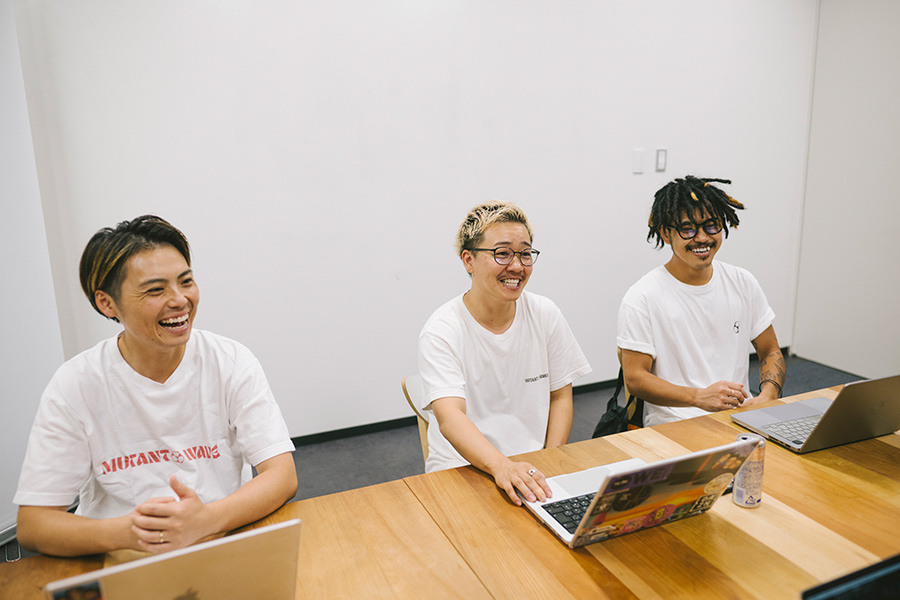
おおちゃん:良かった(笑)。
あさひ:そうなっちゃいますよね(笑)。
おおちゃん:ミュータントウェーブ。の活動で掲げているビジョンには、「LGBT」っていうのは入れていないんです。自分たちはトランスジェンダーっていうアイデンティティを持ちながら、世界中の人たちが自分を好きになれる世界を実現させていこう、ということが僕たちのビジョンです。
まさ:社会をベースから変えていきたいっていうのが僕らの気持ちなんで。
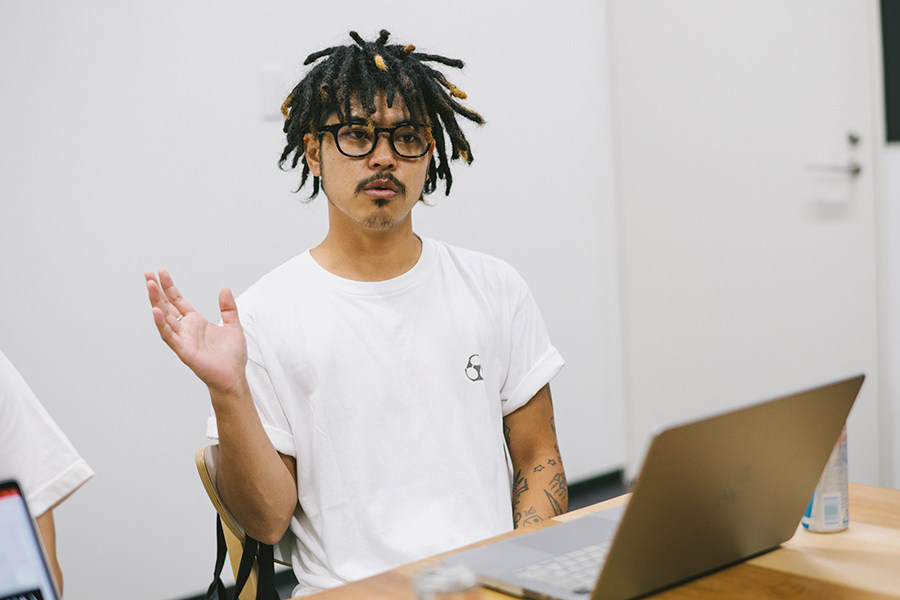
おおちゃん:社会を見渡すと、割といまみんなが言っていることに「ジェンダーレス」っていうのがありますよね。「ジェンダーでカテゴライズされない社会になるといいよね」って。
でも僕らはそこをもっと超えて、「カテゴライズされていてもそのまま尊重される社会でいいじゃん」って思っていて。
ジェンダーレスな社会になるということは、それぞれの人がありたいセクシャリティーから違くなってしまうことだと思うんです。たとえば自分たちにとってトランスジェンダーというのはアイデンティティの中のすごく重要な部分を占めていて、大事にしたいことなんですよね。だから「私はトランスジェンダーです」っていうのをきちんと言えて、それをちゃんとみんなが尊重できる社会にしたいなって思っています。
だからよく「性別とか、そういうのってなくてもいいじゃん」っていう意見もありますが、そこは自由に選べて自由に言える社会があればいいんじゃない? って思っています。
まさ:そういう方向に少しでも社会を変えていきたいよね。
— なるほど。カテゴライズみたいなものを取り払って、無いことにして過ごすんじゃなくて、相手を理解しながら、認め合っていくほうがいい。
あさひ:「カテゴライズされない社会がいい」って言われる場合の大半って、たとえば「私はトランスジェンダーです」って言うことでいじめに遭っちゃったりとか、要するに“言えない社会”があるからそう思ってしまってるんだと思うんですよね。だから「私はトランスジェンダーです」って言ったときにそれがきちんと尊重される社会があればいいんです。
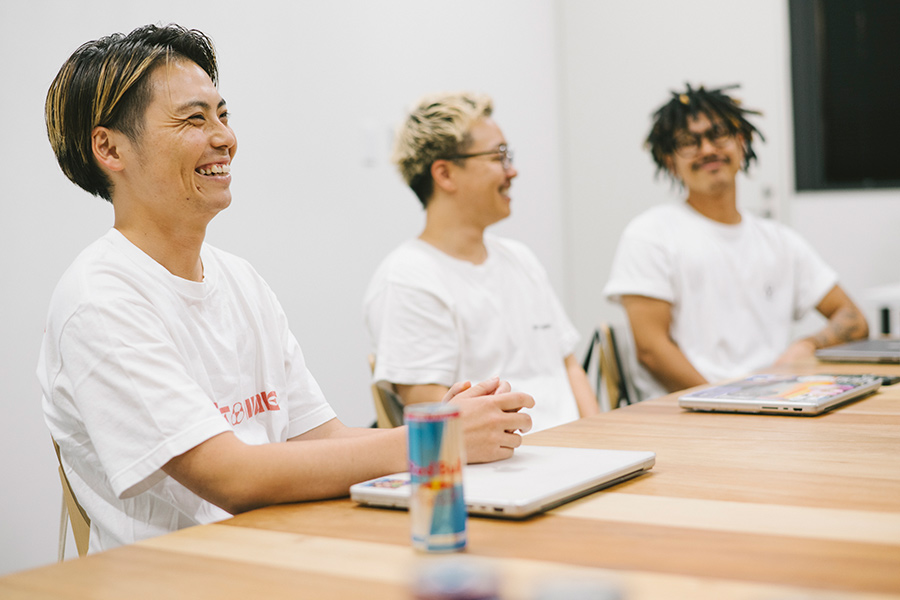
SIWでミュータントウェーブ。と楽しく学べる2つのワークショップ
— 今回SOCIAL INNOVATION WEEK(SIW)では、2つのワークショップを実施されますよね。ひとつめは「一人ひとりの自己理解からはじめるDE&I推進」。
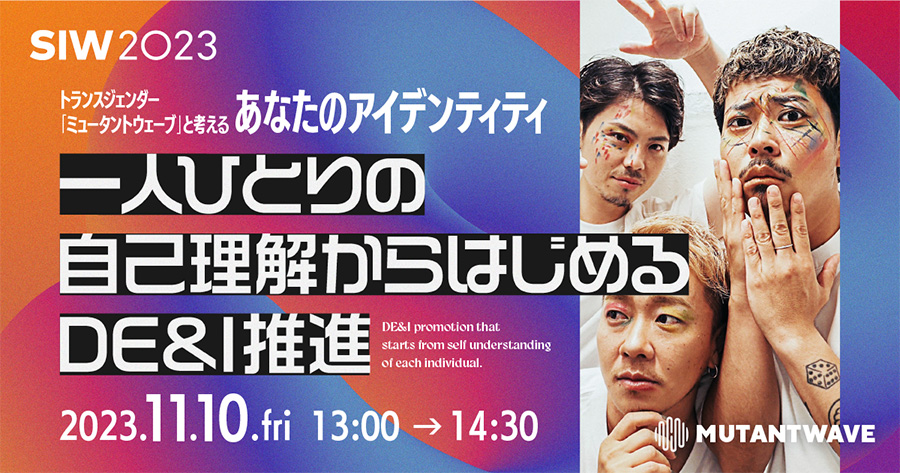
<ワークショップ内容>
・私を見つめる|メンタルを通して知る「本来の自分」とは?
・私とあなたを見つめる|アイデンティティから知る「色んな“ちがい”」とは?
・私を表現する|私はアートで表現します!
詳細)https://social-innovation-week-shibuya.jp/timetable/event/is06/
=============
おおちゃん:これはアイデンティティというものについて、そもそものところから一緒に考えようという企画です。
“多様性”とか“DE&I”といったことを考えるとき、おそらく多くの人が、他人のことを想像してるんですよね。誰かのアイデンティティをどう理解して受け入れるか、という意識で考えがちです。でもその前に、大前提として自分のことをきちんと受け入れられているのか、自分のことをきちんと知って、好きになれているのか——そこから勉強していった方がいいんじゃないかと思っています。他人のことよりもまず「自分って何だろう」というのを知るところから始めようと。
アイデンティティって、自分のことなんですけど自分だけじゃたどり着けないもので、他者との関わりを通して自分を見つめたとき初めてアイデンティティというものが見えてくる。僕らの場合はそのなかのひとつの要素としてLGBTっていうものもあって。
そうやって自分を見つめ直すことで、いろんな人の“ちがい”が学べると考えています。
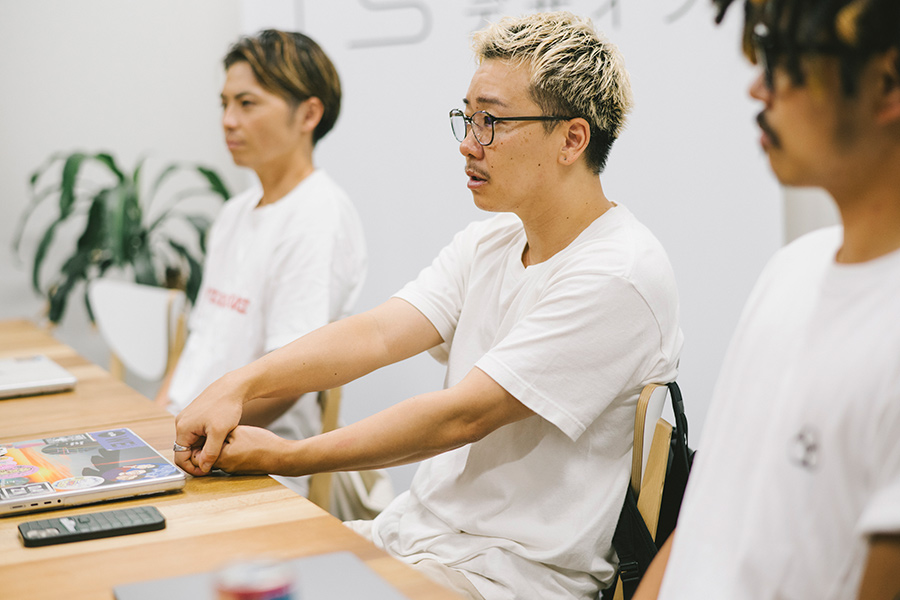
あさひ:他人のアイデンティティを受け入れることももちろん大切ですが、その前に自分にはどういう特徴があるんだろう、という部分を考えてもらう機会を提供したくて。やっぱりそれぞれの環境や育ったルートが違うので、それぞれのルールがあるんだという理解を深めてもらえる時間にしたいなと思ってます。
まさ:そういった機会を、僕ら3人それぞれの特性を活かしながらつくっていきたいと思っています。あさひは普段メンタルトレーニングをやっていることもあってそういったアプローチを今回取り入れていますし、僕の場合は、結構しゃべるのが苦手だったりするので、言葉よりもアートやデザインみたいなものを通して体感できるような内容を考えています。
こんな僕らだからこそできること、というのを今回3人で表現していけたらいいなと思っています。
あさひ:僕らにとっても結構挑戦だよね。それもSIWらしいなと思うので。
— もうひとつのプログラムは、「遊びながら考える親子ワークショップ 〜人とのちがいを知ろう〜」という、こちらも興味深いコンテンツですね。
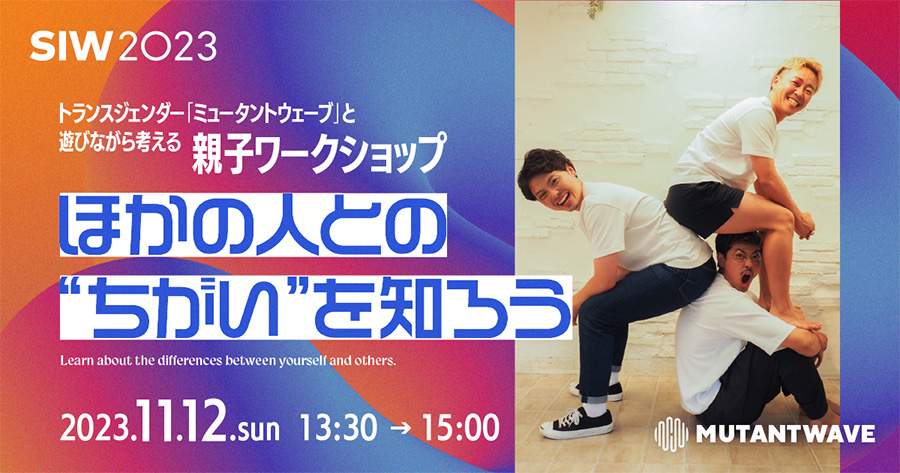
<ワークショップ内容>
・心を解放しよう|プチゲーム大会で準備運動
・お互いのちがいと同じを知ろう|書いて、描いて、動いて、おしゃべりして。
・自分を伝える|普段は言えない私の大切なこと♪
詳細)https://social-innovation-week-shibuya.jp/timetable/event/is09/
=============
あさひ:普段、ジェンダー教育の活動も行なうなかで、こどもたちと関わりながら、一方で先生や親御さんに対しての講演や研修もやっているんですね。そこでよく感じるのが、大人は、自分の考えをそのままこどもにも反映してしまいがちということ。
たとえば、こどもたちに対して僕らが「ミュータントウェーブ。に好きな質問をしていいよ」というときに、こどもが自由にした質問に対して大人が「それは失礼な質問だよ」と、いさめてしまうことがあるんです。でも、それは大人にとって“当たり前”なことでも、こどもにとってはそうではない、というふうにもいえると思うんですよね。
親子といういちばん身近な関係だからこそ、価値観も同じだという認識を強めてしまいがちなものですが、このワークショップでは親子の“ちがい”を体感してほしいと考えています。
親子でなにかの絵を描くとか、ポーズをとるとか、そういういろんなお題に一緒に取り組むなかで、親子で同じことをやっても同じ結果にならないこともある、ということを体験してほしい。そして、いちばん身近な親子でも“ちがう”部分を感じてもらうことで、親子でここまでちがうなら、この広い世界のひとりひとり、同じ人なんていないんだなっていうことを体感してほしいんです。
そして最後は、普段は言えないけど自分にとって大切なこと、そういう本心をちょっと話せる時間を設けたいなと思っています。
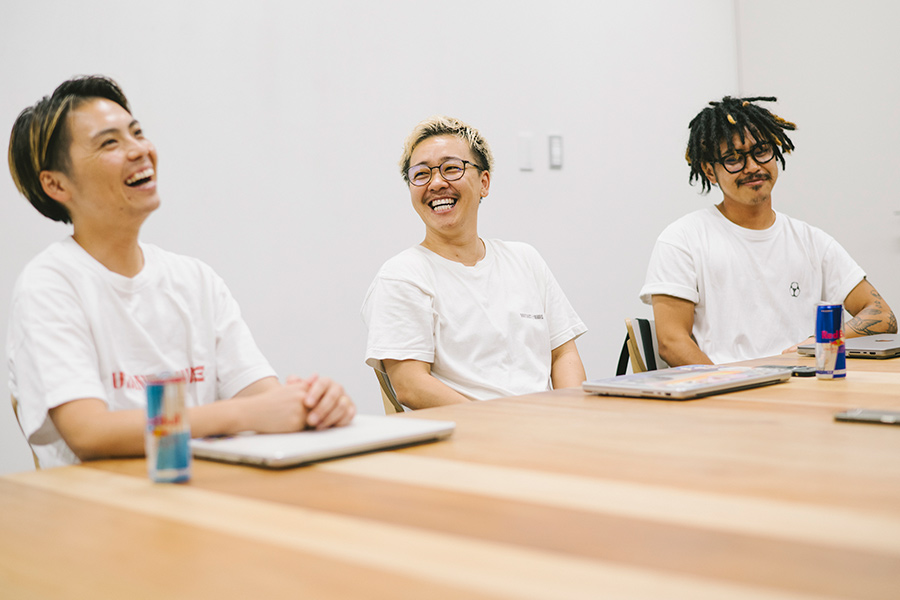
— “ちがう”というのは普通のことなんだ、ということを体感してもらえると。
おおちゃん:ほんとに、結局そこに行き着くんですよね。
たとえば「やっぱトランスジェンダーだから、ひげ生やしてるんですね」とかってよく言われるんですよ。でもいま僕、なんなら脱毛行ってるくらいなんですけど(笑)。
そうやって「トランスジェンダーだからこう」みたいな固定概念を向けられることが多いんですけど、もちろんひとりひとり全然違う。同じトランスジェンダーという背景を持つ3人だからこそ、それぞれの“ちがい”を伝えられるのがミュータントウェーブ。のいいところなので、そのあたりもきちんと伝えられたらいいなと思っています。
まさ:もう絶対楽しいです。絶対。
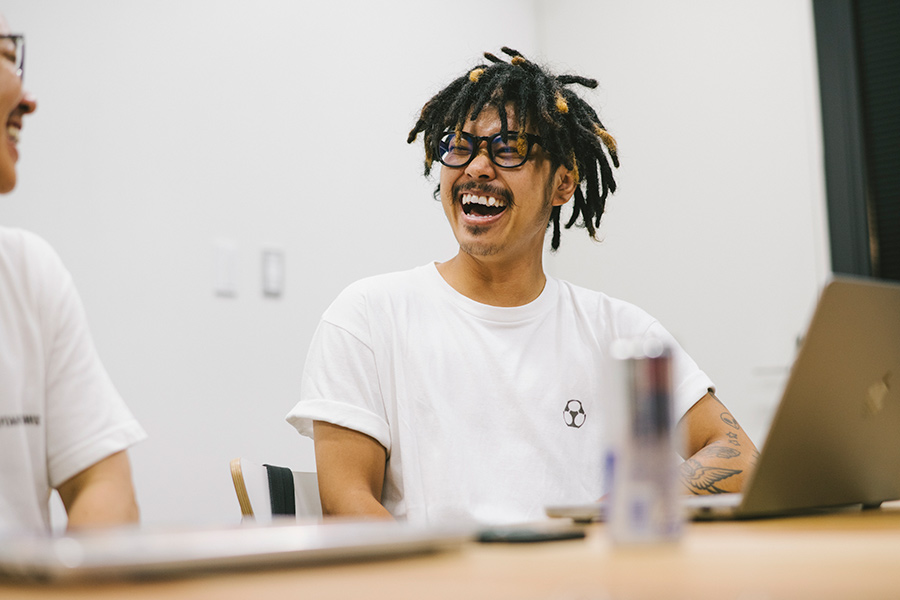
— では最後に、SIW全体に対しては、どんな期待を寄せていますか?
おおちゃん:SIWには、登壇者もお客さんも、分野を超えて本当にたくさんの人たちが集まるので、そこで交われる人の幅の広さっていうんですかね、それが楽しみですし、そこからなにか新しいことが生まれる確率ってめちゃくちゃ高いと思います。僕らもどんな人と出会えるのかすごくドキドキしてるし、学生や、企業の人や、いろんな立場の人がいて、どんな新しいことがここから起こっていくのか、その未知の部分に期待しています。
あさひ:そういう掛け算がどれだけ生まれてくるのかなっていう、まだ見えないワクワク感はありますよね。
SOCIAL INNOVATION WEEK
https://social-innovation-week-shibuya.jp
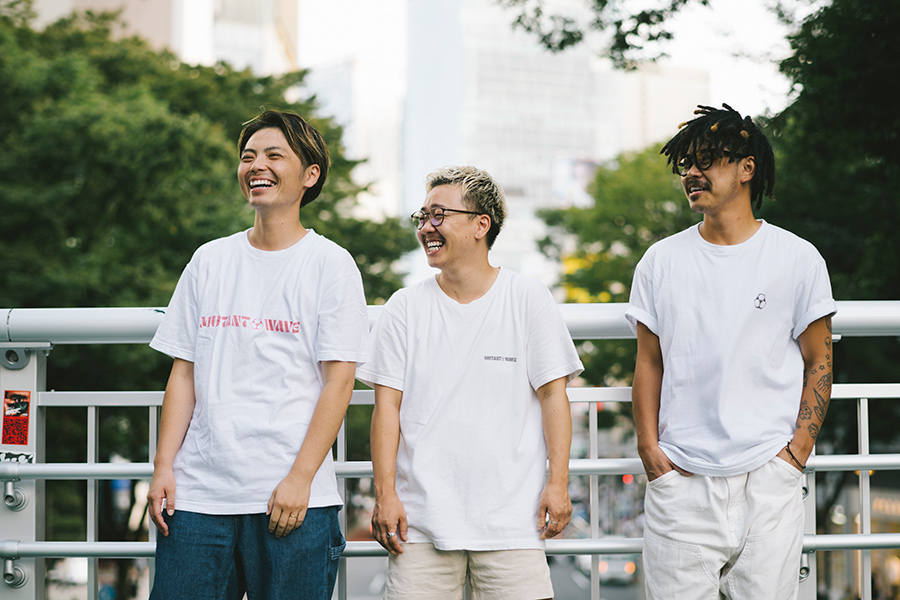
取材・文) 天田 輔(渋谷未来デザイン)
写真) 斎藤 優



